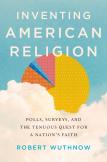Measures of Faith
Robert Wuthnow, arguably the dean of sociologists of religion, presents in his numerous books a brilliant amalgam of quantitative and qualitative information based on interviews and archival materials. He also has worked with the Gallup Organization and the Pew Foundation and has served on the board of the General Social Survey. He seems dubious about the phrase “American religion”—hence his title suggesting it is something invented—when based only on polling data that does not encapsulate local, personal and familial identities, social networks and the variety of religious responses. Polls telling us that 90 percent of Americans claim to believe in God tell us little about what it is people actually believe about God and how they experience God.
As the author notes, it is almost impossible to think about American religion without polling data. Yet, he argues: “polls are ill suited to capture the most meaningful aspects of our personal lives, let alone about the depth, superficiality and complicated relations we may have with religious traditions and practices. They rarely probe in depth the experiences underlying religious beliefs or the narratives through which those experiences become personally meaningful. The intent rather is to generalize and thus reinforce the otherwise tenuous idea that the religion of an entire nation can be aptly and succinctly described.” In his view, the polling industry has deeply influenced—and at times distorted—how religion is understood and reinforced.
Wuthnow cut his teeth as a graduate student under Charles Glock of Berkeley’s Social Survey Center but also worked closely (as I did with both) with Robert Bellah, who stressed a more qualitative sociology based on interviews and social networking. Bellah’s more humanistic style of sociology claimed that religion’s symbols, meanings and rituals are hardly a subject matter that can be readily measured with forced survey questions. Polls often miss nuances, diversity and subtle changes in religion. The key argument for thinking about American religion through polls, however, is that national data is better than mere local data. Numbers do count.
Wuthnow carefully reviews the use of survey data by professional sociologists and by professional polling companies (like Gallup, Roper and Pew). Sociological studies tend to have larger response rates than those found in polls by professional polling companies. They generally carefully report the degree of possible sampling error and statistical significance. They probe for causal connections and deeper religious orientations. Frequently they include, along with their survey data, field observations and qualitative interviews. Wuthnow reviews early studies of congregations or local community surveys oriented toward practical church outreach and ministry. Often, however, these early surveys depended too much on a church-sponsored organization, which could object to or undermine the findings. The Rev. Andrew Greeley’s 1972 national study, for example, done at the request of the U.S. bishops, displeased some Catholic leaders by showing the extent of parishioners’ dissatisfaction with church policies, especially on birth control. Professional polling companies rather often neglect to report their response rates (increasingly as low as 9 percent), sampling error or even the whole battery or order in which they questioned people.
In an earlier period, thoughtful journalists like Kenneth Woodward at Newsweek, Kenneth Briggs at The New York Times and John Dart at The Los Angeles Times, in reporting polling results, equally questioned them and their accuracy or put the data in a larger context. Newspapers have dropped religion commentators, and television, Wuthnow claims, “is inept at reporting about religion,” providing little informed commentary to put numbers in context.
Professional polling organizations find that respondents are reluctant to take part in their surveys. Their response rates are quite small (often 9 percent). In part, depending on land-line phones, they miss many respondents who now use only cell phones. Large majorities are skeptical about polls. Racial and religious minorities are deeply under-represented. Wuthnow shows, for example, relying on a ground-breaking 1993 article by C. Kirk Hadaway, Penny Long Marler and Mark Chaves (“What the Polls Don’t Show: A Closer Look at Church Attendance”), that Gallup data was misleading when compared with that from The General Social Survey, which involved in-person (not by telephone) contact, a high response rate. People, in fact, over-reported to Gallup their church attendance.
Wuthnow suggests we need to question, when reading any poll, the numbers interviewed; the response rate (it is not clear why government surveys have response rates of some 60 to 70 percent compared with 9 percent for Pew surveys); sampling error; the number of times the pollster tried to reach each respondent; the framing of any question (its opening statement, its sequence and relation to other questions asked right before it; the number of questions). Forced-choice questions leave little nuance for deeper-rooted meanings. Gallup argued that people almost always give thoughtful answers. Yet some data show that, over time, when re-interviewed, people give widely divergent answers to whether they are religious or not. In another survey, Wuthnow notes that early, easy to reach, white respondents were higher church goers than those hard to reach. The opposite was the case for African-Americans, which falsely skewed reporting of the actual churchgoing practice of African-Americans.
Wuthnow claims that “social scientists will find it necessary to teach students to be wary of polls and to think about American religion in other ways.” Since his book appeared, I have noticed NPR programs and newspaper articles taking up his argument about being a bit skeptical of taking our view of religion ( is it declining ? How is it changing ? ) mainly or exclusively from polls.
This article also appeared in print, under the headline “Measures of Faith,” in the March 14, 2016, issue.








